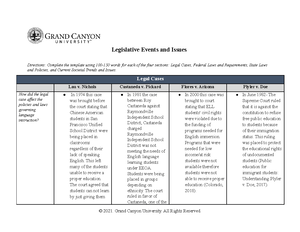- Information
- AI Chat
This is a Premium Document. Some documents on Studocu are Premium. Upgrade to Premium to unlock it.
Was this document helpful?
This is a Premium Document. Some documents on Studocu are Premium. Upgrade to Premium to unlock it.
ELM-250-T1-Professionalism Educator Table
Course: Creating and Managing Engaging Learning Environments (ELM-250)
514 Documents
Students shared 514 documents in this course
University: Grand Canyon University
Was this document helpful?
This is a preview
Do you want full access? Go Premium and unlock all 6 pages
Access to all documents
Get Unlimited Downloads
Improve your grades
Already Premium?

Student: Hope Harris
Instructor: Christi Longin
Date: July 8, 2020
Professionalism as an Educator
Part 1: Describe a professional behavior that will help promote a positive school culture and collaborative relationships. Beneath the
description, use GCU format to cite a professional guideline that supports the behavior. Refer to the resources in Topic 1 to support
your examples. Each example should not exceed 25 words (excluding the reference).
Students Students’ Families Coworkers Administrators
Sample answer: All gay, lesbian,
bisexual, and transgender students
will be treated with dignity and
respect.
Arizona Administrative Code. Title 7.
Education, Article 13. Conduct – R7-
2-1308- Unprofessional and Immoral
Conduct. Retrieved from
http://apps.azsos.gov/public_services/
Title_07/7-02.pdf
Sample answer: When interacting
with families of diverse culture, act
respectfully, and build harmonious
relationships through respectful
communication.
Grand Canyon University. COE
Dispositions, Respect for the
Diversity of Others. Retrieved from
http://www.gcu.edu/College-of-
Education/Resources/ Professional-
Dispositions-of-Learners.php
Sample answer: When in a
disagreement with a fellow teacher,
the conflict will be resolved privately,
with civility and consistency within
district policy.
National Association of State
Directors of Teacher Education and
Certification. Model Code of Ethics
for Educators (MCEE). Retrieved
from http://www.nasdtec.net/
Sample answer: When applying for a
teaching position, the information
shared in the resume and interview
will be truthful and accurate.
National Education Association. Code
of Ethics. Retrieved from
http://www.nea.org/home/
30442.htm)
1. Professional teachers do
not show favoritism or
discriminate against
students. Dedicated
1. Communicating with
parents/guardians in a
timely and respectful
manner that represents
1. Teachers focused on
professionalism are also
concerned with the
school community and
1.
Ensuring that educators are
assigned to positions in
accordance with their
© 2018 Grand Canyon University. All Rights Reserved.
Why is this page out of focus?
This is a Premium document. Become Premium to read the whole document.
Why is this page out of focus?
This is a Premium document. Become Premium to read the whole document.




